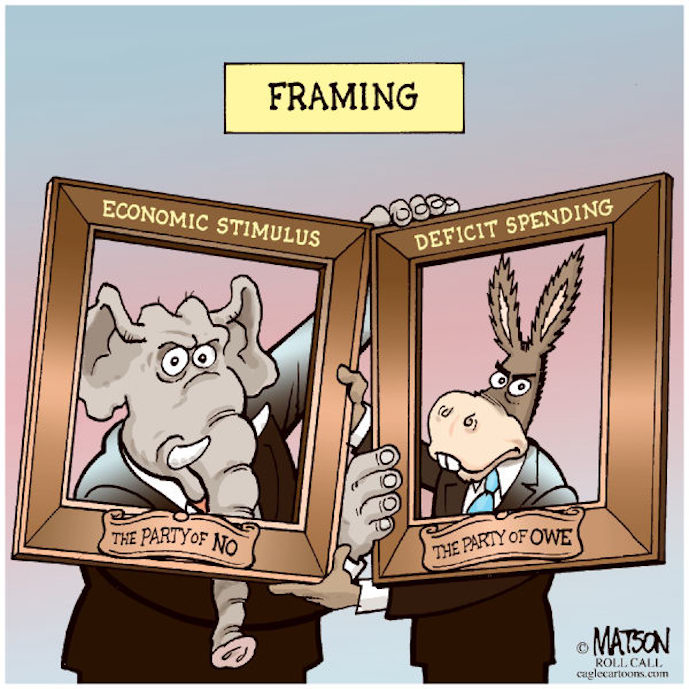
I began this short series on political framing with the image above, and illustrated the concept with some overseas examples. In the second part I used examples from the contemporary federal political scene, pointed out the dangers of accepting political opponents’ framing, and examined ways of countering that framing. In this final part, I will further illustrate framing with some very contemporary political framing.
I hope that these pieces will convince you of the continuing reality of framing in our political scene and the power of a strong and plausible frame in setting the political agenda. I hope too it will offer some hints to Labor leaders as they seek to counter and match the Coalition’s skill at framing.
Abbott was a master at framing. He’s gone now from the top job, or we hope he has, but his legacy persists.
Take the ‘Royal Commission into Trade Union Governance and Corruption’. If the title had not included ‘and Corruption’, it might have been seen as a neutral body assigned the task of examining how unions are managed and governed. But Abbott was determined to frame the Commission’s task as a legal investigation into what he asserted was widespread union corruption. His framing prejudged the outcome. Now that the Commission’s findings are public, Abbott will not be disappointed.
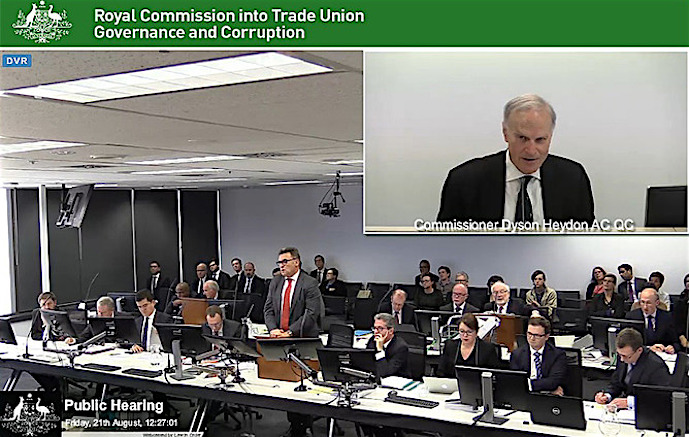
He could have achieved his purpose had the Commission been simply into trade union governance; the terms of reference would have defined the scope of the inquiry. But typically Abbott has never been known for subtlety; bare knuckle street brawling is all he knows.
His naming of the Commission and his stated purpose for initiating it naturally evoked a negative response from Labor and the unions, who immediately and persistently framed it as ‘a political witch-hunt’ designed to ‘get’ Julia Gillard, Bill Shorten, the Labor Party, and by the way, the union movement too. Abbott has probably succeeded in several of his aims, but at the expense of the Commission being seen as biased from the outset, even more so after Commissioner Dyson Heydon was found to be a scheduled guest speaker at a Liberal Party fundraiser.
Here is a classic example of how divergent the framing of the one event can be. Voters are left to decide which framing they find most plausible: ‘shining a spotlight on union corruption’ or simply a ‘witch hunt’ designed specifically to discredit political enemies.
Let’s move beyond Abbott to examine if the propensity for framing has persisted after his ejection by his party. Yes it has. Here are some recent examples.
As mentioned in an earlier piece, newly elected Prime Minister Malcolm Turnbull quickly elected to distance himself from Abbott’s negative framing with “
We cannot be defensive, we cannot future proof ourselves. We have to recognise that the disruption that we see driven by technology, the change is our friend if we are agile and smart enough to take advantage of it. There has never been a more exciting time to be alive than today and there has never been a more exciting time to be an Australian.” The people responded encouragingly to his positive and optimistic framing of Australia’s position in the world. His ratings soared.
In bringing down the MYEFO, Scott Morrison with his dalek Mathias Cormann in tow tried his hand at framing that controversial statement.
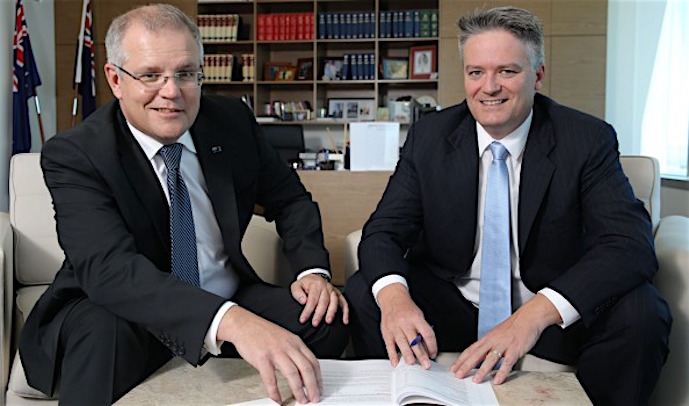
Even before it was announced, Morrison was framing the fiscal outlook with the words: “
We do not have a revenue problem; we have a spending problem.” Sensible economists threw up their hands in despair. They know full well that Australia has a revenue problem, and that it will persist until more revenue is raised. Of course spending can always be reduced, but not enough to close the existing gap between revenue and expenditure. It seemed curious that Morrison should persist with the same framing as the discredited Hockey, when he had an opportunity to break free from it.
To answer this conundrum, it is necessary to look beyond the surface of Morrison’s framing to a deep-seated Coalition frame, namely that it is intent on reducing taxes, certainly not increasing them. To Morrison, increasing revenue equated with increasing taxes, which is anathema to him. Presumably, reducing tax concessions for superannuants and those enjoying negative gearing or capital gains concessions, equates with increasing taxes in Morrison’s mind.
He too proved susceptible to the ubiquitous three-word slogan. Soon he was repeating his own: “
Work, save, invest”. As with all such slogans, he was framing his own fiscal management style. I suppose it is a morphed version of Hockey’s “
Have a go”
When MYEFO finally emerged and economists and journalists examined it, Morrison felt the need to create another frame, one that portrayed the government as knowing where it was going and how to get there, while at the same time warning that it would take time. In his MYEFO address, he announced that the government was ‘making progress’. He said that this year’s budget position will be better than last year and emphasised there is ‘no magic solution’ because the government will not ‘put the safety of the passengers [growth and jobs of Australians] at risk’. Morrison suggested there is no one ‘save’ or ‘tax’ that will solve higher debts and deficits and lower growth forecasts, and that Australians appreciate the government’s ‘patient approach’
Appearing on
7.30 to explain MYEFO, Leigh Sales challenged Morrison with:
“Politics frames everything?”
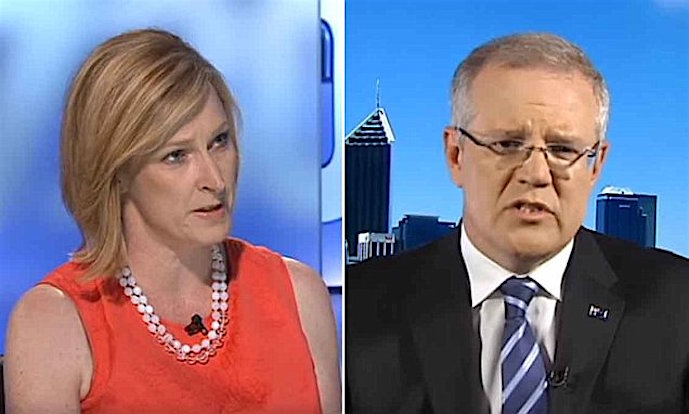
He responded with:
“Well, it may frame things for journalists. What it doesn't frame for me is how we go about setting the tasks of returning the budget to balance. And that's our job and that's what we're doing.”
She retorted:
“I'm directly asking you about rhetoric and the framing that's changed over a short two-year period?”
He returned her serve:
“Well, reality is reality, Leigh. And we're confronting reality and we're dealing with the reality of what's happening globally and what's happening domestically.
“And what is in this statement today is a very sober, very honest and very patient statement which says: we will return the budget to balance - not as an end in itself, by the way, but a means to an end: and the end is jobs and growth.
“And everything we're doing, whether it's in fiscal policy or innovation policy or infrastructure roll-outs: it's all about jobs and growth. And we are not going to put at risk our objectives on jobs and growth by pursuing policies that would be contrary to that objective.”
Being in the holiday season, Morrison thought he could finally fob Sales off with the homely analogy of taking the kids on a holiday:
“It's like going off on that summer holiday: you get in the car; you know where you're going; you don't put the passengers at risk; you get to your destination safely. Of course there will be people chiming in from the back seat like my kids always do, saying, ‘Are we there yet? Are we there yet?’ Well, we are going to get there and we're going to get there with everybody onboard.”
No doubt he thought this was very clever framing at a time of year when most parents would identify with his analogy. Probably many voters did, but some journalists thought it was pretty pedestrian. It is yet another example of how politicians use framing to get their message across by using folksy metaphors.
Writing in
The Guardian, Katherine Murphy was scathing about Morrison’s approach:
“
This budget update has the distinct sound of desperate chasing of rats and mice in the hope that the budget trend will look vaguely credible. Sorry, it still doesn’t look credible. Much more work to do.
“Not only substantial policy work, also framing work. The government is trying to move past the mess of Tony Abbott and Joe Hockey, who came into government with thunderous over statements about the perilous state of the books, while peddling the fantasy the budget could be fixed without pain. But if the reboot is just folksy analogies about back seat drivers getting angsty about budget strategy – that ain’t going to cut it. Australians comprehensively rejected the agenda laid out in the 2014 budget, and the vehemence of the rejection has forced the government to go back to first principles at a time when it needs to be making a case for re-election.
“So what’s the summary? The objective lesson of MYEFO is it’s about time the political conversation about fiscal sustainability and economic reform got serious, because we’ve about had it with the quick fixes and sugar hits and the nasty surprises that appear random because they are random.
“The objective lesson of MYEFO is the government – in budget terms and reform terms – has blown its first two years in government. Whether it blows a third remains to be seen.”
On another front, Julie Bishop tried her hand at framing. Confronted with questions about the Coalition’s unquestioning support of coal, she retorted defiantly: "
Coal-fired power generation is here to stay. "Fossil fuels will remain critical to promoting prosperity, growing economies, and alleviating hunger for years to come."
Within a few days environment minister Greg Hunt took the framing further in the course of defending the Adani Carmichael coal mine, piously saying “
…it would be an act of ‘neo-colonialism’ not to support the mine, because Australian coal would ‘bring people out of poverty’.
Note the humanitarian frame in which these two ministers wrapped coal mining in general and the Adani mine specifically. The lifting of people out of poverty and hunger always pulls on the heartstrings, irrespective of how harmful the method of lifting them.
Finally let’s look at the framing of climate change by Abbott’s former business advisory council chairman Maurice Newman: You can read the whole hair-raising frame
here. Here are some excerpts to whet your appetite and raise your hackles:
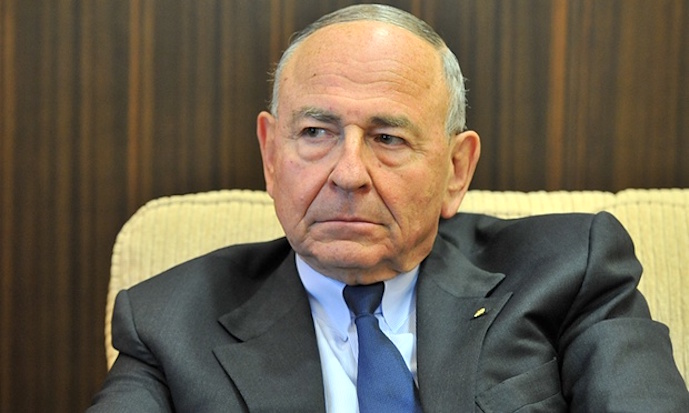
First, Newman criticised Malcolm Turnbull and Barack Obama for prioritising ‘collectivist visions’ over ‘private choice’ in relation to climate change… He accused world leaders of acting ‘like ancient druids pleading with the gods for good seasons’ at the recent Paris climate talks, blasted the final Paris agreement, which aims to hold global temperatures to a maximum rise of 1.5 C above pre-industrial levels, saying there was ‘no empirical scientific evidence’ to support the policy.
He lamented that
“without a Tony Abbott in Canberra or a Stephen Harper in Ottawa, no world leader utters a peep in protest”.
He accused western capitalist societies of giving up on rational thinking: “
They embrace junk science and junk economics and adopt wealth-destroying postmodern pseudo-economics, which teaches that taxpayer subsidies can produce desirable ‘economic transformation’ and faster growth. “Pigs may also fly” he retorted.
“Climate change has cowed once great powers into meekly surrendering sovereignty and independent thought to unelected bureaucrats in Geneva. From the White House to the Lodge, private choice now runs a distant second to collectivist visions. Greenpeace exposes sceptics hired to cast doubt on climate science.”
Newman repeated his previous assertion that the United Nations was more about Marxism than science. “
But then climate change is not about credible scientific evidence,” he asserted.
"It has its roots in Marxism, and ultimately the Green Fund is presided over by the UN Framework Convention on Climate Change, run by Costa Rican Marxist Christiana Figures...”
“…The media, in step with the GreenMachine, will bombard us with climate alarmism to the applause of the leader of the free world, Barack Obama, who says: ‘My mission is to make the world aware that climate change is a bigger threat than terrorism.’ Really? That’s serious. Clearly authority, not common sense or science, now rules the world.”
And so on he goes. Newman is framing action on global warming as a monumental Marxist conspiracy: “
World leaders were succumbing to “bogus science and catastrophism” and considering abandoning fossil fuels – ‘the world’s cheapest, most efficient and wealth-creating power source’ – in favour of ‘costly, inefficient renewable energy’.” He warned that the 1.5 C target would be ‘relentlessly pursued’ by the UN with the help of the media.
As is usual with such radical framing, facts don’t count.
The Guardian article went on to point out that last month the US environmental think tank Oil Change International and Britain’s Overseas Development Institute found the amount spent by G20 governments on fossil fuel subsidies was more than three times the amount spent by the world on subsidies to the renewable energy industry.
Such framing is frightening, but it is embraced by groups such as the ultra-conservative US think tank,
The Heartland Institute, which holds annual conferences for climate deniers. At the last one, Lord Monckton was the celebrity speaker.
That brings us to the end of this three part series on political framing.
I trust the series has explained the concept of framing, the power it has on political thinking, the benefits that accrue from convincing and appealing framing, the downside of inappropriate framing, the danger of adopting opponents’ framing, the importance of countering such framing, and ways of negating opponents’ framing.
Effective political framing is the key to success in politics. Ineffective framing leads to failure.
Conservatives the world over are adept at successful framing; progressives fall far behind. If Labor is to overcome the popularity of our new prime minister, it will have to match his framing, counter framing that is inconsistent with Labor values, and create some stylish and appealing framing for its own values, policies and plans that will win over the hearts and minds of the swinging voters. Is it up to this challenge?
As an interesting exercise, when politicians next offer their policies and advance their plans, try asking yourself: “How are they trying to dress up their proposals to make them sound attractive?’; ‘What framing are they using here?’; and ‘Is their framing reasonable, believable, and most of all moral?’. Expect to find yourself disappointed!
What do you think?
In this, the final piece on political framing, Ad astra used recent events to reinforce the concept and application of political framing, ending with a grotesque example in the climate change debate.
He anticipates you will now ask about politicians: What are they trying to say? What impressions are they trying to create? In what way do they seek to change our opinions? What framing devices are they using?
Are you ready to expose our politicians?
Current rating: 0.3 / 5 | Rated 16 times